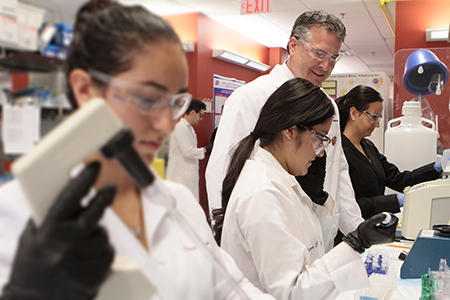By Rodrigo Castaneda
UTEP News Service
The University of Texas at El Paso’s Border Biomedical Research Center (BBRC) has received a continuing five-year grant of $14.4 million. The generous funding comes from the National Institutes of Health’s (NIH) National Institute on Minority Health and Health Disparities (NIMHD), which seeks to address diseases that are prominent in underrepresented groups.
The funds will be distributed over a period of five years. A portion of the grant money will be used to hire six new faculty members with expertise in various diseases. The new faculty will help expand the center’s pathobiology research into biomedical and health issues in the Paso del Norte region. Additional funds will be used to build infrastructure in key core laboratories and to provide technical support personnel, equipment, research supplies, travel to international science conferences and consultant services.

More than 80 faculty members from chemistry, psychology, sociology, and biological, geological, and mathematical sciences conduct research in the BBRC’s high-tech labs, which also serve student scientists from the entire UTEP campus.
Robert Kirken, Ph.D., professor and dean of the College of Science, is among the experts working in the facilities. He also serves as the BBRC grant’s principal investigator.
“We must become advocates for a healthier community through our science and serve as liaisons between the University and the region,” Kirken said. “We want to have a positive impact on the health of the community, but also train the next generation of scientist to continue our cause.”
The grant supports the well-established core facilities at the BBRC used by UTEP investigators and other researchers in the region.
“Now we can start to think bigger,” Kirken said. “Now we can think more about translating this back to the people who need us most, to take it from the laboratory bench to the bedside – the community. The level of research we’re conducting is on par with any research in the very best labs in the country or the world.”
Through the NIMHD’s funding, the BBRC has been able to recruit faculty from top institutions by providing them initial salary and research support in the form of startup funds and pilot project grants.
“Without these funds, it would have been difficult to continue the support of the highly skilled staff that manages the core facilities,” said Renato Aguilera, Ph.D., BBRC program director. “(These new funds) have allowed us to recruit one new faculty member per year.”
With the support of this funding, several outstanding virologists, parasitologists, immunologists and neuroscientists perform invaluable research on diseases like diabetes, cirrhosis of the liver, HIV and AIDS, drug-resistant tuberculosis and certain cancers that are common on the border.
“The availability of these core facilities has allowed our faculty to become highly competitive for NIH and other grants, and these facilities have vastly increased their productivity in terms of high-impact research publications and international presentations,” Aguilera said.
The BBRC was established in 1992 through the NIH’s Research Centers in Minority Institutions (RCMI) program, which strives to lessen the inequality in health status between minority and majority populations by improving the capacity of eligible institutions to conduct biomedical and behavioral research.
As a result of the RCMI program, high-tech research facilities were created at UTEP that faculty now use to advance their independent biomedical research projects.
Not only do experts work in modern labs, but biology, chemistry and nursing students also are able to use the labs for extensive career training, taking their education to the next level.
“If you go to medical school or compete for a job at a pharmaceutical company, the BBRC gives you an advantage,” Kirken said. “Not only do you have a great education, but you have firsthand experience working on equipment that’s usually found only in high-tech industries.”
Steven Martinez, a doctoral candidate at UTEP in pathobiology, takes advantage of the unique opportunity and access the BBRC provides for his current research project, which focuses on mutations found in the JAK-STAT signaling pathways on T cells and B cells.
His project examines the mutations of the enzyme JAK3, which can be a driving force of leukemia or lymphoma. He characterizes these mutations and searches for targeted drugs or treatments for those mutations.
“The BBRC is remarkable because it provides us with extensive access to the latest, top-of-the-line technology that normally wouldn’t be available at other universities,” Martinez said.
Martinez is well aware of the benefits of working in this cutting-edge lab. He acknowledged how the BBRC will make him much better prepared to conduct research once he graduates from UTEP and starts his career as an independent scientist.
The BBRC and NIH grants allow UTEP investigators to establish long-term collaborations with local physicians and researchers in diverse areas such as cancer and health disparities. In addition, plans are in place to expand collaborations with researchers and clinicians at Texas Tech University Health Sciences Center El Paso, Beaumont Army Medical Center and local hospitals.
